📍 It speaks for thousands of kids who walk a line between brilliance and collapse. Weak Hero isn’t just an action drama — it’s a cautionary tale. And a call to listen before it’s too late – from my dear subscriber Elaine.
⚠️ Warning: This post contains in-depth content about adolescent psychology and mental health. There may be triggering elements, so please go back or close this window if you find it overwhelming.
Also, to add: not to diagnose, but I do agree with the analysis that said the way Sieun copes with his negative emotions does seem to align with a lack of ability to understand or regulate himself through typical means. On my first watch through, what struck me about Sieun and Suho’s friendship was the way their dynamic reminded me so much of the autistic-adhd friendship bond.
It’s very common for neurodivergent kids to like/befriend one another with unusual ease, and Sieun’s immediate (and likely for him, very surprising) comfort around Suho would probably have felt like a warm embrace in the form of a human. Viewed through this lens, it never surprised me that he so instantly felt attached to Suho, or that Suho enjoyed Sieun for the weirdo that he is, rather than finding him ‘off-putting’ like most of their other classmates
(from @skgm7420)
Becoming a Weak Hero Hostage: The Burnout Cure I Never Expected
Always grateful for your comments! Like Su-ho said, these discussions of ours don’t exactly put food on the table lmaooo but I’ve been doing this crazy stuff for a month that only a lunatic would do. It’s just stupidly romantic, like what Seong-je talked about lol Anyway I thought I’d be discharged from the psych ward by winter but then some subscriber told me they’ve been held hostage by this drama for 3 YEARS already lol Thanks for confirming I’m not the only one on this planet who’s completely lost their marbles over this show lolol we’re all in this mental institution together bestie!
At first, I said it jokingly. But honestly? Deep down I was getting worried. Wasn’t I spending way too much time on a TV show? Maybe I was wasting those precious few minutes on the train when I could actually decompress from work? Then something unexpected happened when I started having these deep conversations with international fans about the drama.
A close friend who does adolescent counseling had recommended Weak Hero Class 1 when it dropped three years ago, but I’d completely forgotten about it. Teen action, really? Didn’t exactly grab me. When season 2 hit Netflix, fan creation shorts and old drama reviews started getting pushed back up in my YouTube feed. Eventually, the bombardment worked – I found myself clicking on season 1 out of habit.
Is this the power of Netflix money? Eventually, the bombardment worked – I found myself habitually logging into Netflix and finally clicked on season 1. That simple little “accident” was the beginning. I stayed up all night binge-watching all 8 episodes, and I had this immediate gut feeling: “What the hell did I just watch…? If I’m hooked, I’m properly hooked.”
Around this time, I was suffering from work burnout. Without any real plan, I was commuting every day fantasizing about submitting my resignation letter, thinking “wouldn’t it be better to just get fired?” Then, in the middle of all this, I got hit by what we call a “fandom accident” with Weak Hero. You know how when you’re in an accident, you desperately look around to see if there are other victims whose lives have been equally destroyed by the same crash? YouTube was perfect for that. I started exchanging comments with fans who’d been willing hostages to this drama for as long as me…
maybe even longer, seeing Su-ho through Si-eun’s eyes, and trying to better understand Beom-seok on that “ring” who left me with what I can only call “cinematic trauma” – I even bought the official script book and started reading it on my commute home.
Discussing and debating the deeper meanings woven between the lines of the direction with countless fans – strangely enough, my burnout started to ease. It was a surprising experience that I couldn’t quite understand myself. I used to always doze off on the train home from work, but when I’d pull out my tablet to make videos and exchange comments back and forth with commenters, oddly enough, I didn’t feel tired at all. So I could clearly sense that the passion I was pouring into this drama was coming back to me as this strange kind of happiness.
To put it Su-ho’s way, “do these discussions put food on the table?” and in Seong-je’s terms, it’s stupidly “romantic” nonsense – but while it doesn’t feed me, I’d say “the romance passes with flying colors.”
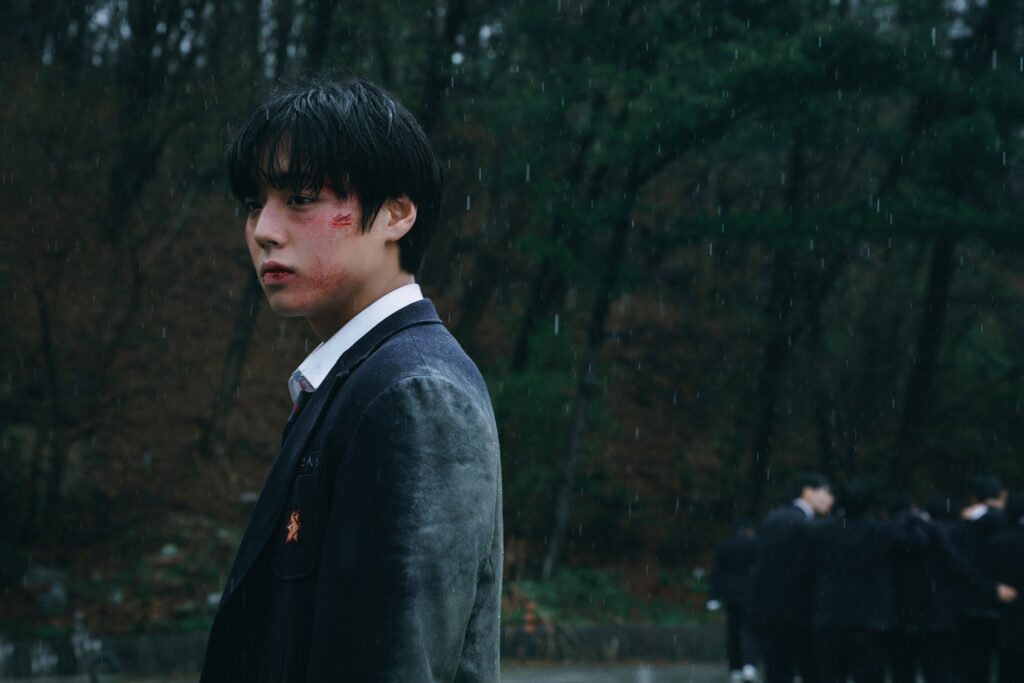
Have I Been Through a Syndrome?
I wonder if the production team intentionally released Class 2 around late May to early June, when Si-eun, Su-ho, and Beom-seok first met, but anyway, mid-July when Su-ho falls into a coma in the Class 1 timeline is steadily approaching. I’m frantically working on wrapping things up because if I don’t organize all these deep discussions and reflections I’ve shared with fans about this masterpiece by then, I feel like I’ll never be discharged from the ward (?), just like countless other “patients” who’ve confessed they’ve been unable to let go for a whole “3 years” now.
Since accidentally getting hit by this fandom crash with this drama – it was like catching a fever, a cold that struck in early summer when I was completely defenseless. But it was a welcome visitor. I think it was two months that were stupidly, ridiculously romantic.
I interpreted the work from multiple angles, analyzed the characters, and reinterpreted angles I couldn’t see through the eyes of commenters. I wanted to pour out the emotions I felt watching this masterpiece somewhere online, and now I want to carefully preserve the discussions I’ve shared with commenters. I felt this personal sense of duty to leave behind somewhere a tribute from an individual fan to this masterpiece that came to me after such a long time – almost like a savior-level destroyer (?) of my daily routine.
The passionate commenters who helped create this channel together, especially ‘Elaine’ – like the final passage of her recent long comment, this syndrome that came like an early summer cold ‘strangely’ made me happy, and maybe I really did experience a bit of a mental syndrome because of Weak Hero.
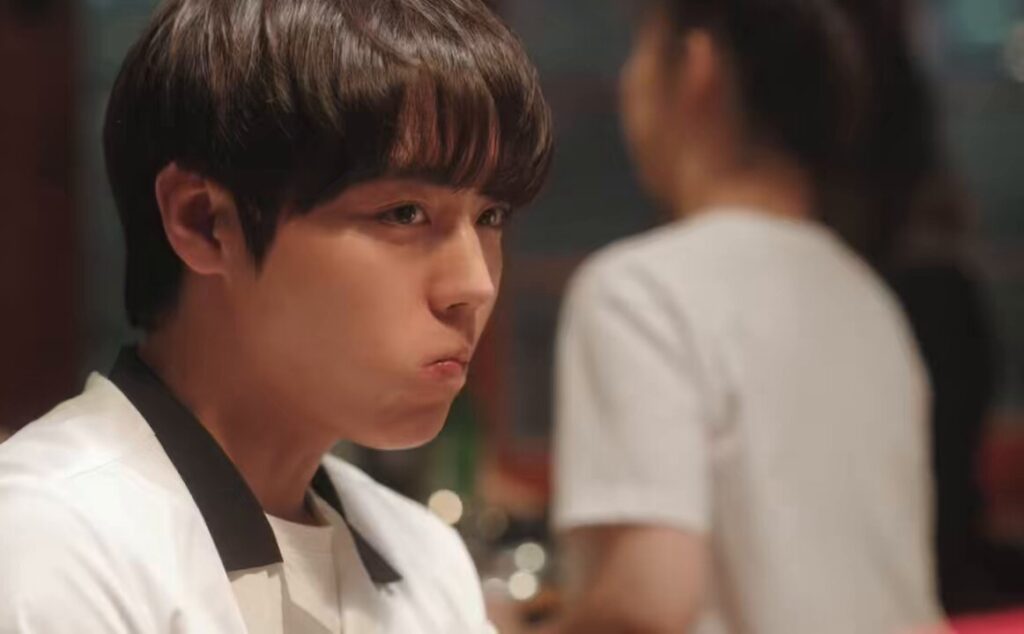
Miracles Born from Old-Fashioned Tributes
Actually, I’m trying to eek out a response to your last website blog post because I think you’ve pretty much nailed it in your conclusions about Si-eun, and that makes me strangely happy. So, see you around, Jennie, and have a great weekend.
Elaine’s touching comment, especially the last line, will probably hang in my heart like some thread-thin string for a long time. Particularly when she said in that final line that the conclusion I eventually reached about Si-eun as a character made her strangely but happily moved – I felt like I could understand what she was trying to say and where that emotion was coming from.
Considering that she’s a native English speaker, there’s this conciseness and directness that the language offers, yet it feels almost curated (one of the thoughts I often have when talking with native speakers at work is that looking at my colleagues’ word choices, rather than intentionally selecting those words, it seems like they’re using words that have already been curated because English as a simple language has been developed over a long time to have the most streamlined structure possible – after all, that’s how you conquer the world…).
Since it pursues efficiency while simultaneously needing to have impact, for non-native speakers who use English as a second language and work tool, the two emotions always felt when hearing English expressions or words are efficiency and impact.
Elaine probably encountered this work much earlier and has been mulling over and organizing her thoughts about it for a long time, participating in deep discussions whenever the opportunity arose. (She even mentioned that she discovered my YouTube channel through ChatGPT!) When I read her comments that feel almost like poetry to me – whether they’re near-critical-level analyses or expressions curated with concise, essential words that strike deep – I suspect (though I don’t ask because it might be rude, and I have no intention of asking in the future) that she’s likely doing academic research on the Asian media industry, or more specifically on Hallyu. (I’m probably right…) Looking at the spectrum of comments she leaves, you can tell she has deep knowledge not just of Korean dramas but of Asian culture in general.
This is the gratitude I expressed in my reply to her… but compared to the Weak Hero content that pops up in YouTube feeds, my voice-focused analysis is relatively “old-school,” and in this fast-moving world of Shorts, there probably aren’t many viewers who would patiently “put up with” long-form content, so maybe I really did create a stupidly romantic channel, Seong-je style. (As long as the romance passes, that’s all that matters!)
On the other hand, creating scripts in English – a language that’s not my native tongue but a communication tool – takes a considerable amount of time. If I wanted revenue proportional to this time investment, I know it would be faster to use more “less” “romantic” methods – like stimulating curiosity with clickbait thumbnails or producing Shorts focused on action scenes. I’m not trying to judge other YouTube creators’ content, but quite a lot of content was using Weak Hero images and videos provocatively. (Some content with very high view counts used AI to process videos into extremely provocative and sensational images, with titles that even included “AI ruined”…) There were levels that would be difficult for fans who truly cherish this work to create.
Anyway, since I can earn pocket money at my day job, I decided to stick with this stupid romantic method of rambling to myself in an “old-school” “tribute” style. (In the end, my burnout was alleviated, so it really became a romance that passed!) So it was nothing short of a “miracle” that commenters who leave old-school tributes as much as I do discovered this channel and poured their time into it.
And this fever that I suffered through “strangely” and “happily” as my coping mechanism for work burnout continued for nearly two months, with deep character analysis and liberal translations that were intentionally left out to avoid cultural misreadings (I personally think Su-ho’s wordplay went through the most liberal translation…) or contexts that were missed through crude translations hastily baked instant-style on platforms I’d never heard of before – international fans began to catch these nuances, and the depth of appreciation we shared through comments only kept growing.
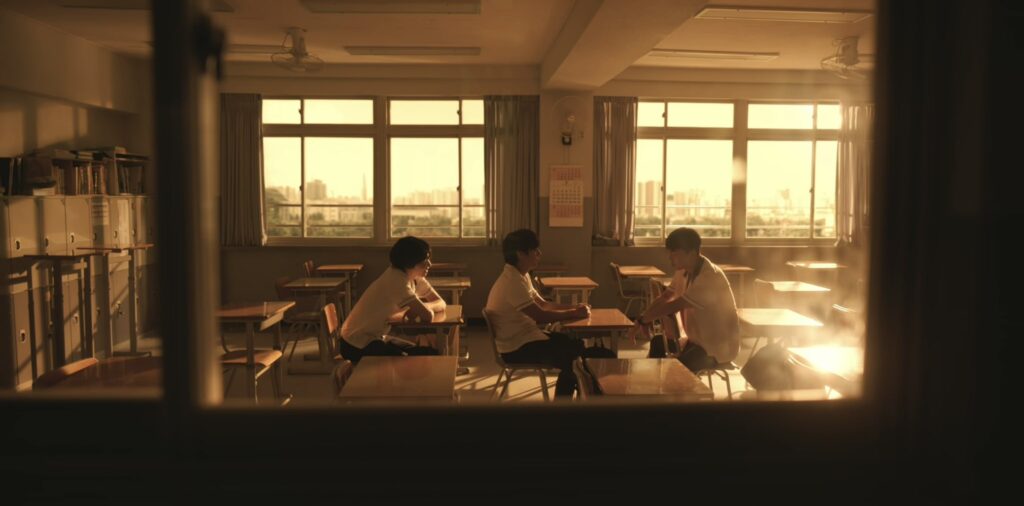
Weak Hero isn’t just an action drama
While I’m grateful for all the comments, the ones that particularly posed various questions to me were opinions related to what the work might be hinting at regarding the characters, especially Si-eun’s mental state. What director Yoo Su-min wanted to say about the character Yeon Si-eun through the beautiful face of actor Park Ji-hoon – the meaning hidden between the lines, sometimes a story so transparently conveyed that you can’t help but recognize it as ‘It’s a cautionary tale’ as Elaine stated earlier – one of those stories (or perhaps the ‘most’ ‘ultimately’ intended one) might be about the ‘mental illness’ that teenagers experience – comments like this were scattered throughout. Going beyond simply Si-eun losing Su-ho and being prescribed ‘sleeping pills.’
Maybe I’ve run this far because I wanted to talk about mental health issues – this heavy topic that most people don’t touch because they find it boring, aren’t interested, want to avoid it, or don’t see practical rewards worth investing their time in.
Of course, in dealing with boy characters who have extraordinary temperaments and very heavy narratives, or who face tragic endings where they must endure trials too great for their age – enough to leave cinematic trauma – the work would have needed some kind of cushion, a neutralizing device, which is why they borrowed the beautiful face of actor Park Ji-hoon and the pure face of actor Choi Hyun-wook, who was at the boundary between boyhood and young adulthood at the time.
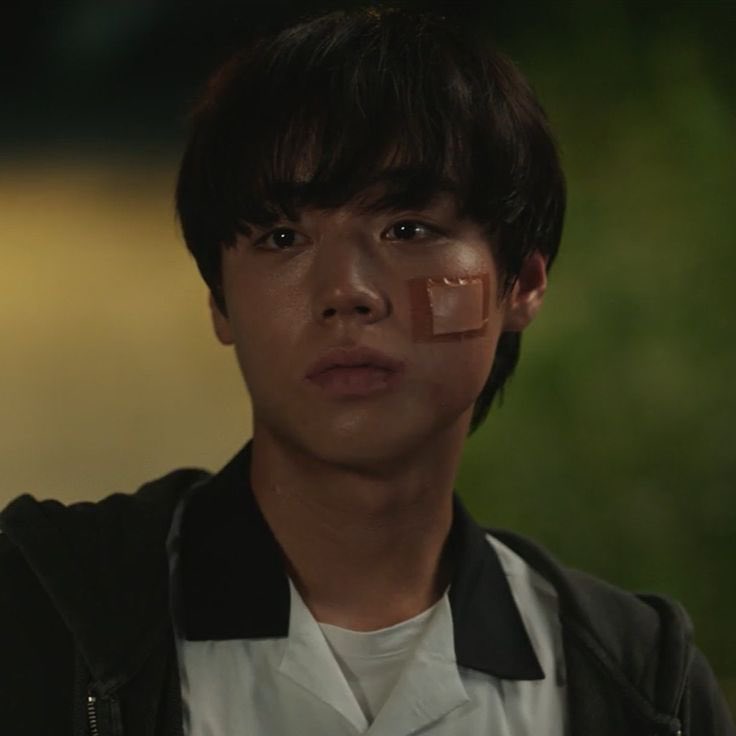
I suspect the director showed great courage in revealing this topic – one we try to avoid touching, especially one that Korean society turns away from even more – broadly speaking, societal pain. Though intense growing pains preceded it, when Si-eun finally stood at the threshold of adulthood, like Su-ho’s greeting “It looks good” when he awakened in perfect timing… I think they wanted to convey through Si-eun a small hope that healing and continuation are possible even within pain.
Both directors Yoo Su-min and Han Jun-hee are fundamentally artists who know that truth cannot be brought to the surface without touching society’s wounds, and through excellent direction and equally well-refined scripts – described as genius-level within the fandom – they succeeded in gracefully delivering a hopeful message without forcing it.
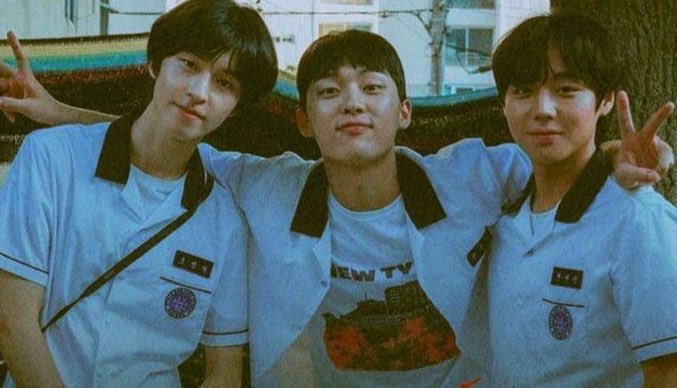
There are kids like Si-eun in reality. More than we’d like to think. It’s just that most of them break down in ways that are quieter and more hidden than Si-eun. What’s portrayed through Si-eun in Weak Hero Class… is actually accurate. I suspect the director and production team did their homework. (from my dear subscriber Elaine)
My biggest wonder
The point I want to clarify is this – whether it’s my friend who works in adolescent psychological counseling and recommended this drama early on, the passionate commenters, or myself, none of us has any intention of putting any diagnostic label on Si-eun or trying to specify exactly what’s happening to the boy.
I think this work gave many hints about various external factors that have influenced or could influence Si-eun, but was carefully directed so as not to put a specific label on the boy or box him in. So fans are just speculating and “exploring” Si-eun’s mental state from various angles, and we don’t see defining it as particularly important.
In the subtitles that I saw (for that scene where little Si eun overhears his parents fighting)? They were clearly arguing about whether or not they should have had him and it was obvious that they were both regretting the decision. He had broken his arm. Dad was asking mom where she was when it happened. She shot back that she agreed to have him because they were going to raise him together. And dad said he hadn’t known that the boy would get hurt so much. Little Si eun would have been convinced that he was unwanted, (and a disappointing, inconvenient problem) after hearing that, so he goes to his room, locks the door and does math. Which became his way of dealing with the fact that his parents didn’t want him. He locks everyone and everything out by only doing school work. And that’s what he keeps doing from then on. It’s totally a coping mechanism. If this is what he does, nobody and nothing can hurt him and he can prove his worth to himself and, maybe also to his parents and others. (from my dear subscriber Elaine)

But I think the implication is also that little Si eun gets overstimulated out in the world and so he shuts down. He faints and falls and since he’s small boned and frail, he gets hurt. I wonder if he also gets bullied or maybe he’s trying to be athletic to please his dad and he’s not coordinated enough at that age. But my biggest wonder is whether or not a medical team would decide that he was neuro-divergent and belonged somewhere on the autism spectrum. Isolating himself. Not communicating. Focusing his whole life on one thing. Becoming overwhelmed by outside stimulus and/or internal floods of feeling … these could definitely be signs that he is on the high functioning side of the autism spectrum. So, perhaps it’s not just a coping mechanism to block out his parents. It’s never discussed but I think it’s being implied that he could be somewhat neuro-divergent. Which, even undiagnosed, would have put his achievement-oriented, high expectation, parents into disappointment, denial and maybe even fear. And it would get him bullied at school for sure. (from my dear subscriber Elaine)

Not just Elaine, but many commenters have consistently mentioned that Si-eun’s obsessive immersion in math problems is a coping mechanism the child found as “a source of comfort through predictability and control, and a way to deal with an unstable or unpredictable world.” So when young Si-eun overhears his parents fighting – their indirect but clear regret about raising a child – the boy returns to his room, locks the door, and instead of lying on his bed crying his heart out, he starts obsessively solving math problems.
What I also completely agree with are the characteristics of Si-eun mentioned in various comments. His obsessive and intensely focused concentration on academics, the episodes of suddenly losing consciousness and collapsing in childhood, the way he isolates himself socially or becomes isolated, the noise-canceling earphones that he tells Su-ho he wears because “it would be annoying if people talked to him” but which he clearly wore all day due to noise sensitivity, his particular difficulty regulating emotions when anger builds up, and the extreme stress he experiences when his own routines are disrupted – these patterns have often been pointed out as characteristics suggesting that he processes the world differently from children who are relatively typically developing, and I completely agree with this as well.
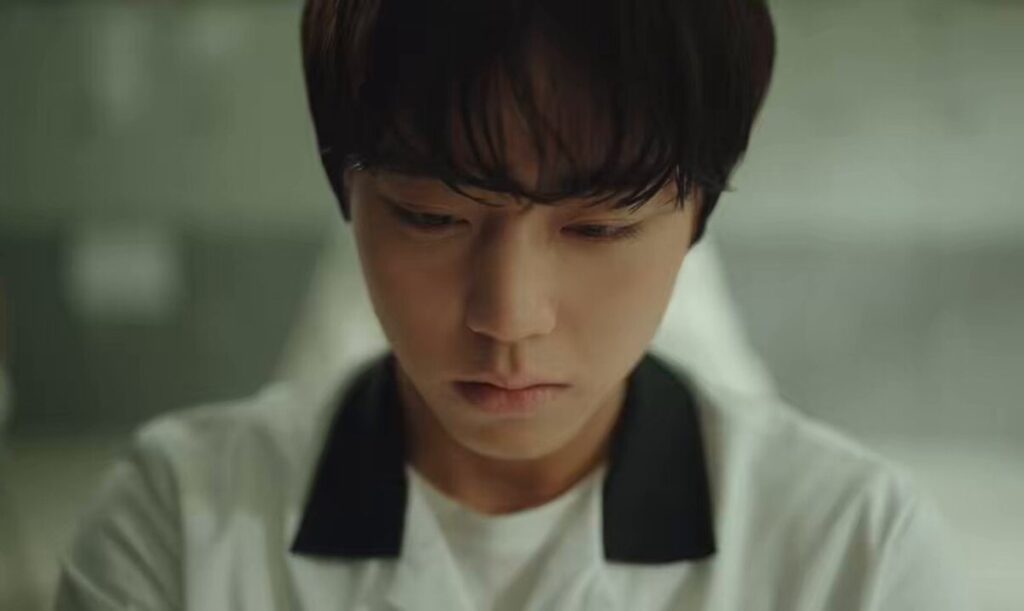
What completely resonated with me about Elaine’s message defining ‘Weak Hero’ as ‘It’s a cautionary tale’ is that this drama had the realistic necessity and obligation to summarize the vast webtoon content into just an 8-episode chapter – essentially having to fit the drama into the OTT platform structure.
From the perspective that every scene in Class 1, perhaps every single second of footage, had to carry symbolic meaning, the director responsible for the screenplay would have faced the obligation to do very meticulous and careful curation of the original content. (And this must have caused extremely intense stress for the creator…) So virtually no scene in the drama could be wasted, and every direction, sequence, and scene had to be imbued with symbolic meaning.
As a fan who loves this work, what I want to praise most is the careful and sophisticated directorial approach that didn’t rashly try to define the intense emotions the boys experience toward each other in adults’ “boring” language. (Even when it comes to defining them with specific words that exist in the world, borrowing Director Yoo Su-min’s words about “sufficient time” – that is, after 3 years, Si-eun’s emotions were mentioned as “first love,” and if we had to define all the tsunami-like emotions Si-eun received from Su-ho – awe, attachment, stability, laughter… friendship and love – with just one language that exists in the world, it could only be platonic “first love”…)
The excellence of direction that simply left the boys’ emotional lines, which rose like heat haze, for viewers to follow subjectively. (Even Beom-seok’s final “kick” on that “ring” was left alone, postponing value judgment and letting us naturally feel Beom-seok’s actions…)
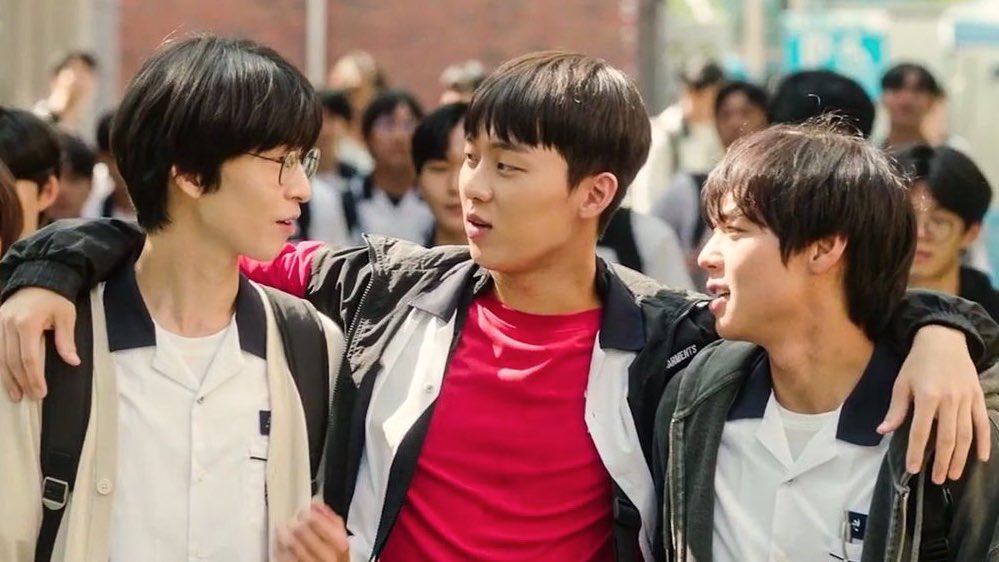
But in contrast to this, though I haven’t read the original work yet so I don’t know well, I was curious whether Si-eun’s childhood narrative was handled with such explicit narrative in the original work as well.
It shows as a full sequence – not just a fleeting scene – young Si-eun’s parents in their room, not caring that their child might overhear, raising their voices in an argument where they unload the burden of child-rearing and shift responsibility – even alluding to their regret about having the child. (This is the sequence Si-eun recalls while still solving math problems from his hospital bed, where he’s admitted after taking a group beating from the bullies in Su-ho’s place…)

Of course, this is just the personal interpretation of passionate commenters and myself, but I believe that hints about the boy’s neurodiversity issues or Si-eun’s mental health issues that might place him somewhere on the autism spectrum – which Elaine and other subscribers often pointed out – emerge not only in the father-son dialogue but also indirectly and sometimes very explicitly in the direction that portrayed the character Yeon Si-eun. When Si-eun returns home with injuries, his father asks:
“You didn’t faint again, did you?” “I don’t do that anymore”
Fundamentally, this is a dramatic directorial device born from the necessity to reveal the special “lunatic quality” that the character Yeon Si-eun possesses and his extraordinary character with high “IQ” above general intelligence that he would have inherited from his judo silver medalist athlete father and mathematics educator mother, and on the other hand, to connect the similarities between Si-eun and Beom-seok by containing a deep and dark narrative.
But from a personal lens, I believe this drama sufficiently hints through its direction at the mental problems of teenagers represented by Si-eun that are by no means light.
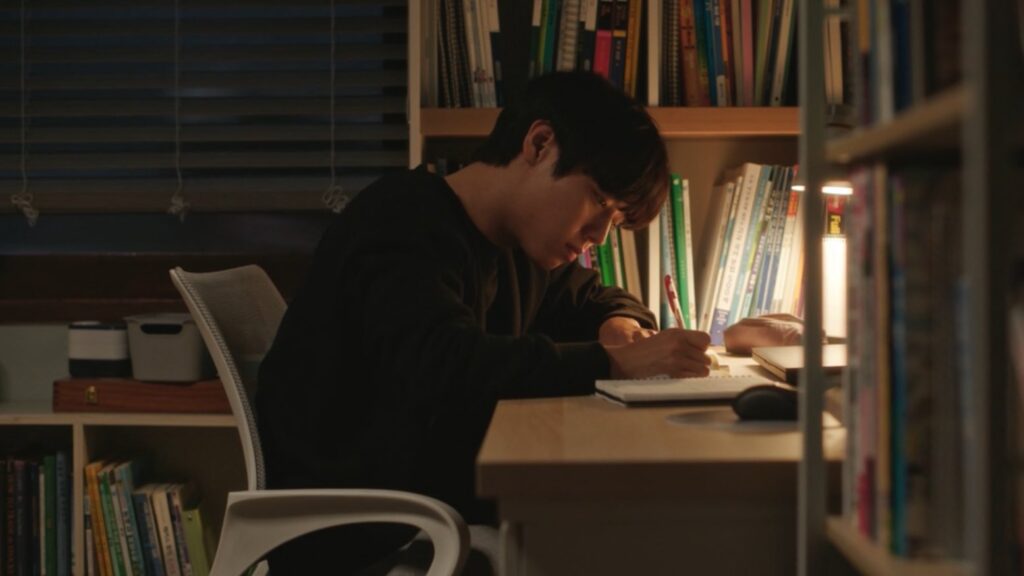
Why does he get so extremely angry?
When you first watch the drama, you get excited and enjoy the adrenaline rush from action scenes where this quiet boy with lovely deer eyes and a cute cat-like face suddenly shows his claws. (One commenter said that up to this point, even Su-ho was sitting in the back row ‘enjoying’ the situation, and of course he was…)

But as you binge-watch the drama, you sequentially approach quite meaningful questions: Why does he get so extremely angry? Why can’t he control it? Wasn’t his goal to get into a prestigious university? Why does he explode like there’s no tomorrow when it might leave a stain of being a ‘school violence perpetrator’? What does Si-eun really want? And countless commenters who have been trapped by this drama for three years already have steadily provided their own answers.
For example, Young-bin, who is a bully, as he says, needs social recognition for his mother and also as a means to boost his own self-esteem, so he cares about academics and actually maintains excellent grades. (While other friends indulge in drugs at the club, he actually leaves to prepare for mock exams…)
But Si-eun’s attitude toward academics is quite different from Young-bin’s. At first glance, he has the face of a perfect model student holding the title of first in his class, but Si-eun’s academics don’t seem to have as clear purposes as Young-bin’s. His need to go to a prestigious university or maintain excellent academic performance would have been an inertia naturally expected by his parents since childhood, and it would have been the easiest means available for a highly intelligent child to gain recognition of his existence and himself from parents busy with their careers. For a boy with that level of IQ, maintaining excellent grades probably wasn’t that difficult.

But when you look closely, aside from passive purposes like meeting expectations that are like parental inertia, no expectations about the world that forms him can be found in Si-eun. While it’s true that the boy is obsessed with the “perfect circles” on test papers, he’s not building self-esteem or accumulating thrilling achievement through those perfect grades either.
As one commenter pointed out, Si-eun seems to have “given up” at some point on the expectation that he would someday receive the sufficient attention he should have gotten from his parents. Going further, the fact that he doesn’t maintain basic daily elements like adequate sleep or proper meals shows that Si-eun’s “certain deficiency” has already been negatively affecting the boy in no small way from the outside for quite a long time, and while it probably was the same during elementary and middle school, in the school where he spends the longest time during adolescence and which is the biggest society and world, he doesn’t interact with anyone. He doesn’t make a single friend, and he doesn’t even talk to anyone.
Is this really something we can just dismiss as “don’t all top students act like this?” Can we really write this off as just the quirky characteristics of a valedictorian whose sole purpose in their school years is getting into a prestigious university, someone whose entire life revolves around academics……
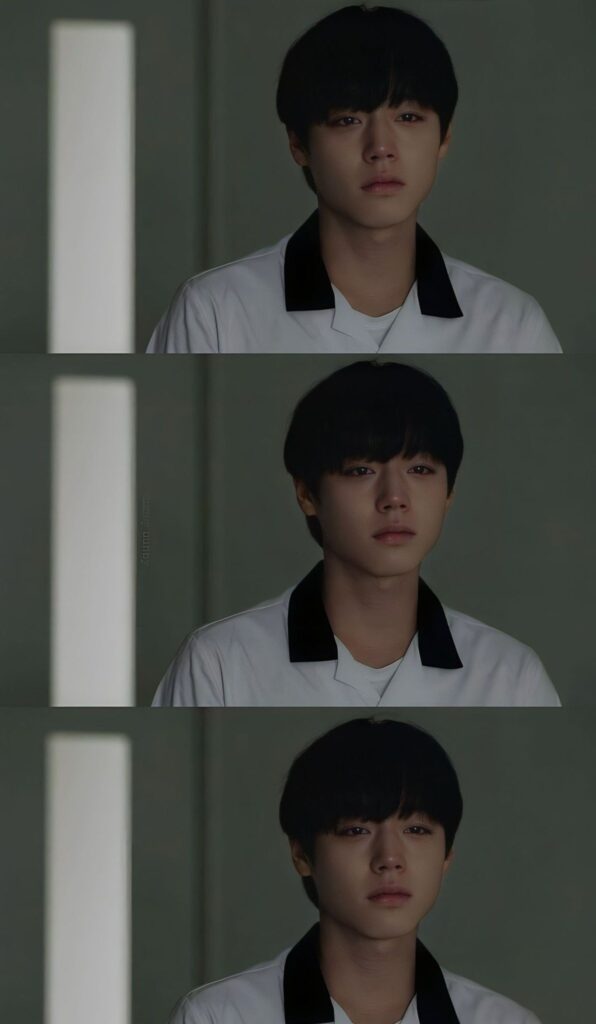
It speaks for thousands of kids
Watching Si-eun, I couldn’t help but be reminded of my own school days. The intense stress and competitive psychology I witnessed in those friends who were “academic high-flyers” at school, their narrow social circles, the English vocabulary books they wouldn’t put down even while eating lunch, and those problem workbooks they practically had their noses buried in… the afterimages of several friends who were entirely devoted to academics naturally overlapped with Si-eun.
If they were friends whose academic performance was among the top in the nation, they would have been praised as “prodigies” or “geniuses,” smoothly wrapping up their school years and mostly walking socially recognized career paths. But among them, the afterimage of one particular friend kept lingering in my mind.
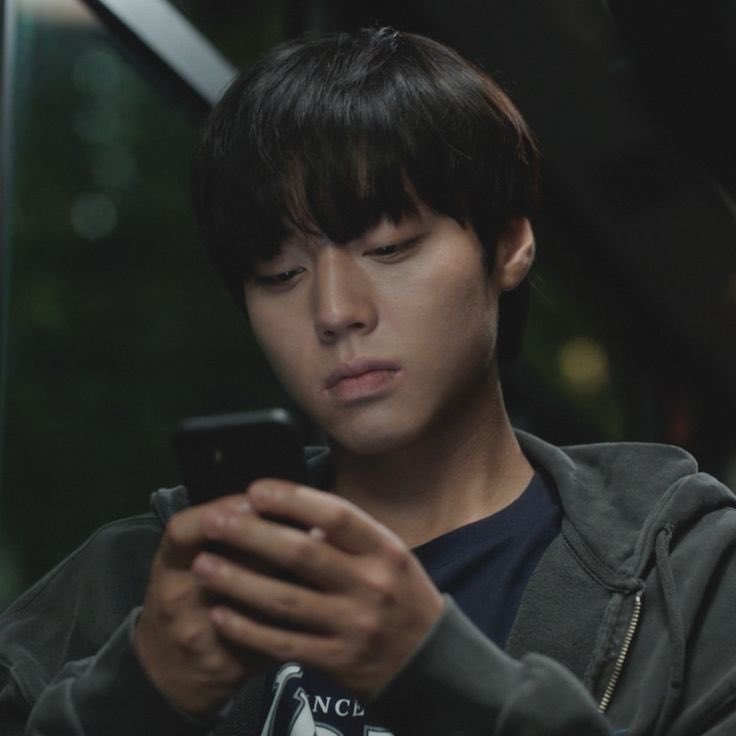
It was a conversation we never would have shared if we hadn’t been assigned to the same room for a school event, but it remains in my memory to this day as a certain kind of sadness… It was a confession that sounded almost like talking to herself, about how she often thought about ways to ‘check out’ of this world without pain. She too would sit all day in the seat right in front of the teacher’s desk with her nose buried in her books, always hunched over just like Si-eun. One difference was that, unlike Si-eun, just as my friend had hoped, there really were no groups who interfered with or disrupted her studies.
This sentence that Elaine left for me was exactly the trigger that made me want to write this post. “It speaks for thousands of kids who walk a line between brilliance and collapse. Weak Hero isn’t just an action drama — it’s a cautionary tale. And a call to listen before it’s too late.” As someone local to Korea, I’m flooded with countless K-content, but knowing that I won’t encounter another work that resonates as deeply as Weak Hero anytime soon, I wanted to take one more step forward now that I’ve come this far and conclude my final thoughts on this work with ‘this topic.’ Elaine and I shared the question ‘Do kids like Si-eun exist in reality?’ and through various research, we came to face the conclusion that ‘there are many children who collapse in ways that are quieter and more hidden than Si-eun.’
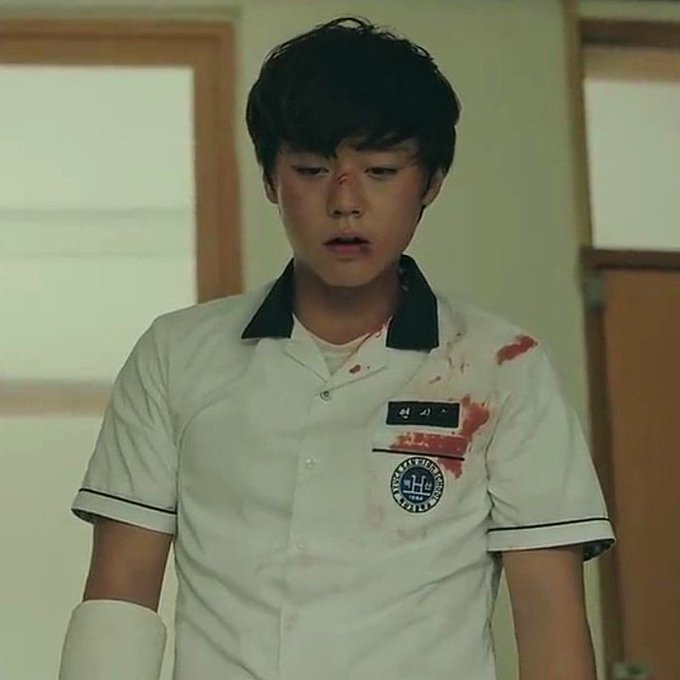
Going completely ballistic
Leaving those old memories behind and returning to the story of the drama, I want to talk a bit more about Si-eun’s self-harm. Even Si-eun’s uncontrollable violence unleashed on Young-bin in episode 1, in my personal interpretation, was close to Si-eun’s ‘self-harm.’
While Si-eun’s irregular eating and sleeping patterns were frequently mentioned in the comments, what personally concerned me most was that Si-eun doesn’t interact with anyone at school – the society that has the greatest influence on someone his age. He doesn’t make a single friend, wears earphones all day, and doesn’t talk to anyone.
At first glance, this might be dismissed as the obsessive behavior of a study bug who doesn’t want to waste even a single minute, but looking beneath the surface, it’s likely because he doesn’t want his withdrawn emotions to be discovered, or because he doesn’t want to experience emotional overload. Based on his conversation with his father about fainting, I interpreted the cause of his frequent fainting episodes as emotional overload.
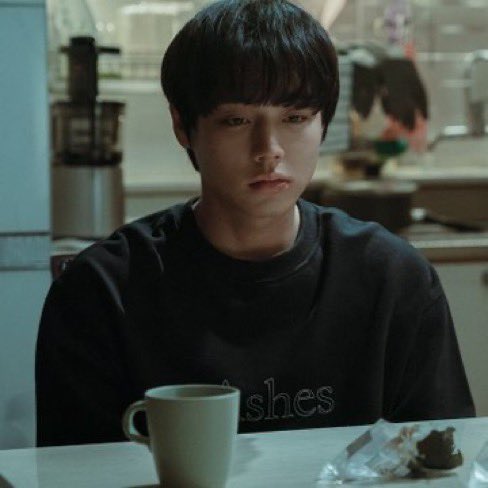
But the problem that worsens here is that Si-eun harbors internalized anger, and when the triggers for that anger involve problems with the rules and perfection he obsessively maintains, as well as his attachment objects, it becomes uncontrollable and escalates to a level of ‘self-harm’ that is most damaging to Si-eun himself. Interestingly, the drama doesn’t portray Si-eun’s anger heroically at all. It’s quite different from how they depict Su-ho’s action scenes, where he maintains almost perfect emotional control while fighting.
When he was actually smashing Young-bin’s face, he counterattacked like a cornered animal, and if Su-ho hadn’t intervened at the right time, Si-eun had no rationality left to control that counterattack himself, so Si-eun probably would have gone all the way. While some violent resistance was necessary as legitimate self-defense against bullying, it was at a level where he wouldn’t have any excuse if he were expelled immediately, and all the kids in the class were watching that situation unfold.
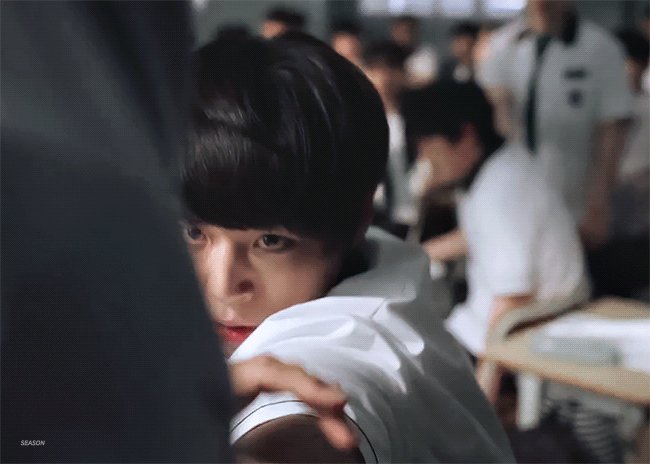
For Si-eun, the perfect array of circles on his test papers would have been his only defense mechanism that assured him of his safety in an environment that was either chaotic or difficult to control. Therefore, when the bullies finally succeeded in breaking those circles, his going berserk like a wild animal was a natural explosion for Si-eun, who secured his sense of control – a kind of lifeline – through his obsessive immersion in studying.
And as many commenters have mentioned, Class 1 has a perfect parallel structure, where Si-eun, who went wild in episode 1, loses what was essentially another emotional lifeline – Su-ho – and goes completely ballistic.
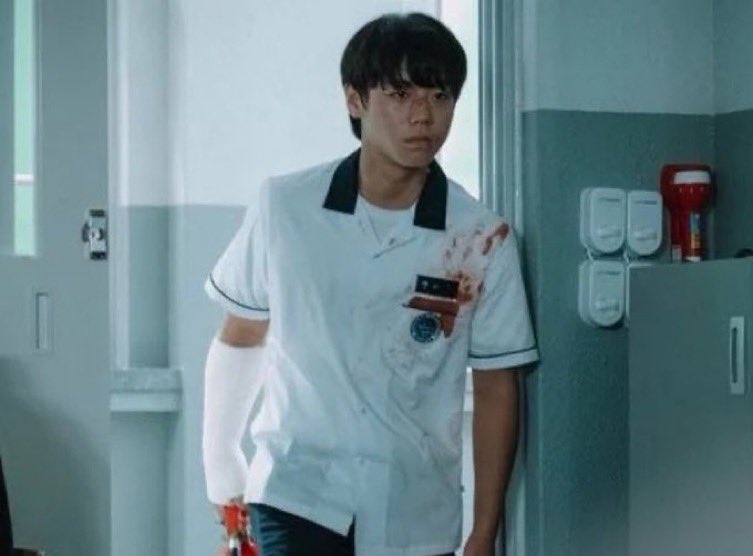
The triggers for his madness are different
Below is a compilation of in-depth conversations I’ve had with commenters about one of this drama’s brilliant symmetrical structures – where Si-eun’s going ballistic in episode 1 connects to his going ballistic in episode 8 – though the triggers for his madness are different.
I completely agree with you that Si-eun going ballistic feels totally realistic. I think that what makes Si-eun unbeatable is the fact that at that point, he has nothing left to lose. It is a great parallel in the drama that the first time Si-eun goes ballistic, it happens for a similar reason. At the beginning, all he had in his life that mattered to him were academics. So when the bullies started messing with it, he lost control.
The parallel structure between Si-eun’s first explosion and his final one isn’t just clever writing – it feels to me like the emotional mathematics of a boy whose entire world gets reconstructed and then destroyed.
By the last episode he lost the most important person who saved him from his self-imposed loneliness. Him perceiving that he lost that relationship and also feeling responsible strips him of any kind of rhyme or reason. He attacks everyone because once again he has lost everything that mattered to him, except the second time when it happens it destroys him on a much deeper level.
Si-eun’s parents have essentially neglected and/or abandoned him. They expect him to be self parenting and almost perfect. But his father, an Olympic silver medalist in judo, has also, clearly, been disappointed that his son has turned out to be frail and easily hurt. So, Si-eun has adapted accordingly. He’s become an isolated, stoic, scholastic automaton who lives in an extremely rigid world where he denies his basic needs for food, sleep, and relationships.
I actually watched all 8 episodes in one night with zero expectations and no prior knowledge… I just randomly clicked on this drama on Netflix with the remote. By episode 7… you know, when Su-ho collapses… I was like ‘wow, I’ve fallen down a rabbit hole I never saw coming’ and I was crying while watching it.
So I also… up until that moment when Si-eun breaks the window… I thought ‘ah, Si-eun could have hurt himself in the most harmful way possible…’ Since I had those thoughts, the scene where he completely destroys the bullies who did that to Su-ho didn’t feel unrealistic to me at all…
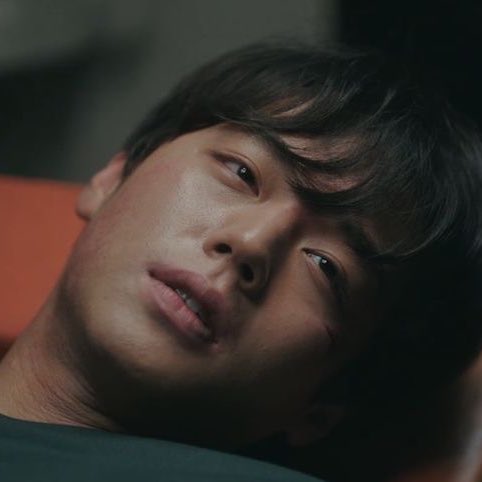
Si-eun might be a neurodivergent kid
Obsessively intense focus on academics, episodes of suddenly losing consciousness and collapsing in childhood, the way he socially isolates himself or becomes isolated, particularly his difficulty regulating emotions when anger builds up, and the extreme stress he experiences when his own routines are disrupted – these patterns suggest that Si-eun processes the world differently from typical children, and I completely agree with this. And like Si-eun, many children in reality appear fine on the surface but need help from trustworthy adults or professional care.
After binge-watching this drama several times, I began to view it through a personal lens that suggested the directing was hinting at Si-eun’s neurodivergence to some extent, and in some ways, I came to interpret the drama with the possibility that Si-eun might belong on the high-functioning autism spectrum. (Personal interpretations vary depending on the viewer’s lens…)
In that case, as mentioned frequently in various comments, viewing it through this lens, the commenter’s observation that Si-eun and Su-ho remind us of an autistic-ADHD friendship bond is sufficiently related, and the fact that neurodivergent kids very commonly feel comfortable with each other and quickly become friends, Si-eun’s immediate comfort around Su-ho and instantly feeling attached to Su-ho, and the direction showing how Su-ho enjoys Si-eun’s weirdo nature from the beginning – unlike the other classmates who find Si-eun off-putting – all naturally resonate.
Rather than necessarily labeling each of the two characters as autistic-ADHD, I wanted to talk about the immediate bonding and deep attachment formed between these two characters, and if I had to mention something specifically, I wanted to address the higher possibility that Si-eun, more than Su-ho, might be a neurodivergent kid.
And I wanted to raise the question of whether immediate response and attention, or more broadly, appropriate care, was provided when his parents or surrounding adults noticed this. As we’ve already confirmed in the drama, the answer is ‘no’, and they likely assumed that a valedictorian model student wouldn’t have any particular concerns, or even if they had noticed their child’s mental issues at some point during childhood, they probably denied it and brushed it aside.
Especially even if some traits corresponding to the autism spectrum were discovered in Si-eun, they might have dismissed it by saying ‘that can’t be…’ using his excellent academic performance shown since childhood as an excuse…
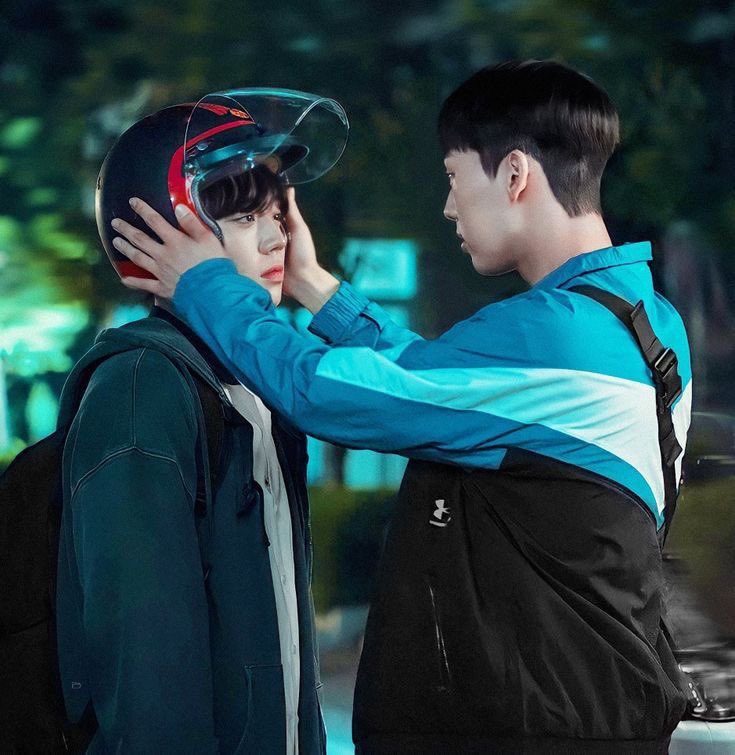
Another lifeline, his friend Su-ho
And then Su-ho came slicing through Si-eun’s walls like a knife through butter, suddenly throwing open the door to his world through that misdirected food delivery. When Su-ho mistakenly delivers to the wrong address and opens Si-eun’s tightly shut front door, Si-eun experiences all the emotions he should have rightfully received from his parents – deep attachment, laughter, stability, and love – like overwhelming waves in such a short period. If Su-ho hadn’t mistakenly found his way to Si-eun’s door, Si-eun wouldn’t have been able to break out of his shell.
To expand a bit more on my friend’s comment, while it was good that Su-ho helped Si-eun break out of that solid shell, the range of emotions Si-eun felt toward Su-ho was so overwhelmingly intense and wave-like that if these two boys had existed in the real world, there might have come a point where Si-eun became overly dependent on Su-ho emotionally.
Though this is purely speculation through my personal lens reading between the lines of the direction, while Beom-seok greatly admires and idealizes Su-ho, constantly being ‘conscious’ of Su-ho’s presence, Si-eun is depicted in several cuts with his eyes following Su-ho’s figure. The slightly obsessive yet intense focus he shows when dealing with precious things like his ‘studies’ overlaps when he’s watching Su-ho.
What I totally agreed with was this: just like Si-eun had treated those perfect circles on his test papers as a lifeline, that same perfectionist streak and intense focus he’d developed for anything he started holding dear would likely have shifted over to his other lifeline, his friend Su-ho.
Even his willingness to get his own hands bloody or take beatings in place of his friend came across more like desperate behavior – like this kid who had barely experienced stability and attachment was sensing in advance that the uncontrollable psychological breakdown that would hit him if this precious person suddenly vanished would be way more unbearable than any physical pain he chose to take on himself.
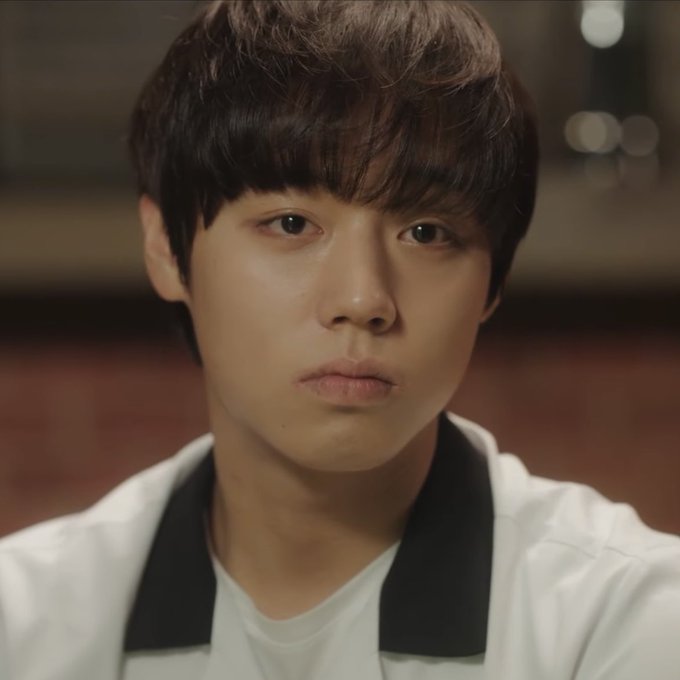
In other words, Si-eun’s coping mechanism of sacrificing himself to this extent for things like those perfect circles on his test papers or for his friend might not have been the healthiest thing for Si-eun himself. In this context, I think it was brilliant direction that Si-eun had to experience the trauma of losing Su-ho.
For Si-eun to sustain his own life, he can’t keep self-harming. He probably had to go through another growth stage that was painful but ultimately necessary, and putting Su-ho in a coma, though I feel sorry for Su-ho, who had to spend more than half of his high school years in bed, was dramatically excellent directorial choice.
Coming down to this point, the remaining question I have is this: While God sent Su-ho to Si-eun as a gift in the name of friendship, do the real Si-euns in reality have trustworthy adults or guardian angels who will intervene appropriately? Some children silently collapse internally, developing depression, anxiety disorders, and suicidal thoughts. Or like Si-eun did, some children ‘explode’ when crisis situations arise, retaliating violently or collapsing emotionally completely.
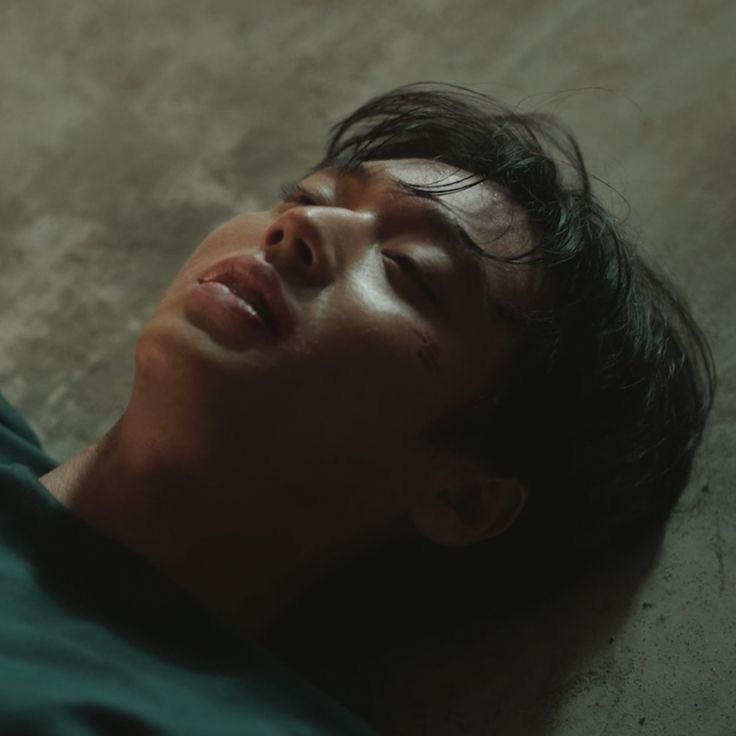
The Mental Health Story Weak Hero Really Tells
And personally, I saw these real children who silently collapse internally in Si-eun from Season 2. Si-eun’s insomnia was already spoiled in the final episode of Season 1. “The causes of sleep deprivation in teenagers include…” Since Su-ho fell into a coma, Si-eun has been spending hellish sleepless nights. Si-eun’s room, which had been brightly lit in yellow, now sits coldly subdued like the weak blue light from the lamp hanging over his table, and even with sleeping pills, the boy can’t fall asleep until 3 AM.
While the scene of him taking prescribed sleeping pills is very clearly depicted in the direction, there are many interpretations that Si-eun’s awkward gait indirectly portrays how the boy is consumed by deep depression, and I agree as well.
In Season 2, there are exceptionally many cuts capturing Si-eun from behind, and you can easily notice that when the boy walks, he barely moves his arms in sync with his steps, and his form is awkward. This is interpreted as signs of depression and anxiety, and pointed out as indirectly directing a signal that he’s disconnected from reality, as if his mind and body aren’t synchronized.

Even though the depth and scope may differ – Si-eun’s mental issues have been a topic frequently discussed with commenters, so Elaine’s comment can be said to be a grateful opinion that summarizes all the discussions we’ve had so far.
So, the messages about mental health would be the perfect thing to concentrate on, I think. There are lots of clues and hints. There’s a moment when Si-eun is on the bus and there is a radio commentator (?) talking in the background … about a study where kids reported being stressed and not getting enough time to decompress or sleep and so the voice concludes that they’re working too hard at school. Then we see that he’d rather be choked and not report it, instead of getting a note for trouble on his reports. lol. how ironic.
In s2 we see that he’s being forced to see a psychiatrist but he won’t even talk to her because he’s so depressed and doesn’t see the point of it. He doesn’t want therapy. He wants a different life and his friends back but, of course, she can’t do that for him … And then his flat voice and expressionless face. His not caring about a lot of things. His lack of energy. Not sleeping. His wanting to push everyone away. He is totally self-isolating. And self blaming. All kinds of cognitive distortions. Not even a doctor would be able to fully diagnose someone like Si-eun without a thorough, accurate history … but it’s pretty hard not to look on and conclude that Si-eun is no stranger to depression; probably an ongoing clinical depression that’s been going on for years … and then it gets worse before it gets better.

The Hope of Recovery: The Eunjang High Chapter
After Si-eun completely fell apart in Class 1, with nowhere willing to take him in, he barely dodged juvenile detention and got shipped off to Eunjang High. But thanks to that, Si-eun, who’d been living like an emotional zombie, ended up meeting Ba-ku, Go-tak, and Jun-tae, and his friendship with these guys – not too close, not too distant – gave him a much more sustainable friendship pattern to look up to.
His decision to let go of Beom-seok’s hand on that ring – the one that had been putting him through hellish sleepless nights – symbolized his determination to free himself from the guilt he’d been holding onto and his choice to heal and grow despite his losses.
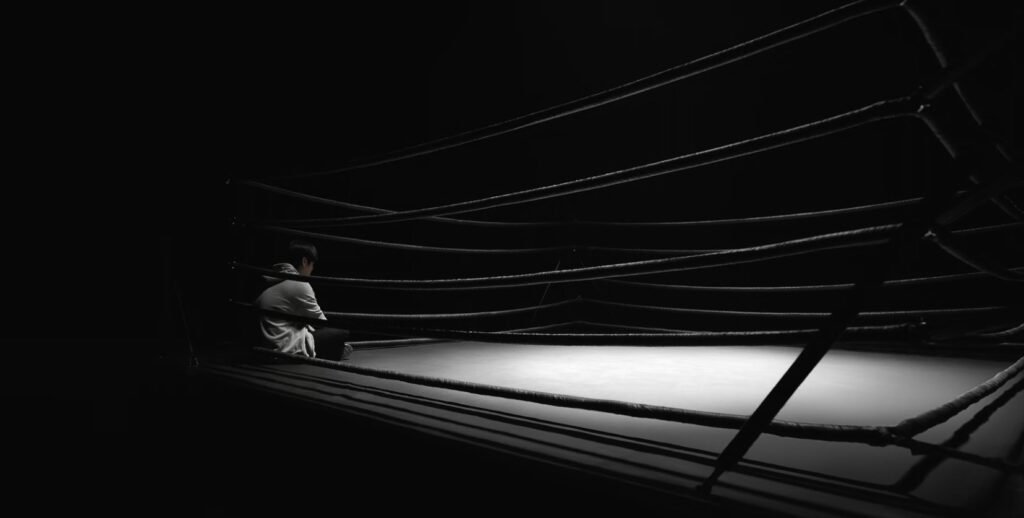
And while the drama didn’t spell it out explicitly, anyone who really gets this show could feel the hope that Si-eun was slowly breaking free from the shadows of the deep psychological struggles that had been weighing him down. We can see his depression starting to lift when he’s able to build meaningful relationships with people who accept him for who he is without expecting perfection – and if he can keep those kinds of relationships going… with people who’ll actually stick around… then maybe he gets closer to just being a regular introvert. Who knows how much he can recover?
The massive psychological breakdown Si-eun went through as the price for losing Su-ho wasn’t simply tragedy but the psychological growth he had to go through. It’s like a bird breaking out of its shell – you can’t survive just by breaking out. Si-eun had to learn to live without his coping mechanisms – perfect grades and Su-ho as his lifelines – to truly grow into an adult.
If he had kept trying to protect those lifelines by scarring his own body and shedding blood, he never could have grown up properly, and the people who care about Si-eun wouldn’t want him to keep hurting himself either.
So when Su-ho woke up from his long sleep and saw Si-eun running over with his friends, the fact that he said “It looks good” out of all things he could have said carries real weight. He was genuinely proud of and celebrating Si-eun’s growth into a bird that could fly on its own. Apparently, Su-ho’s original line was supposed to be “Our Si-eun has really grown up.”
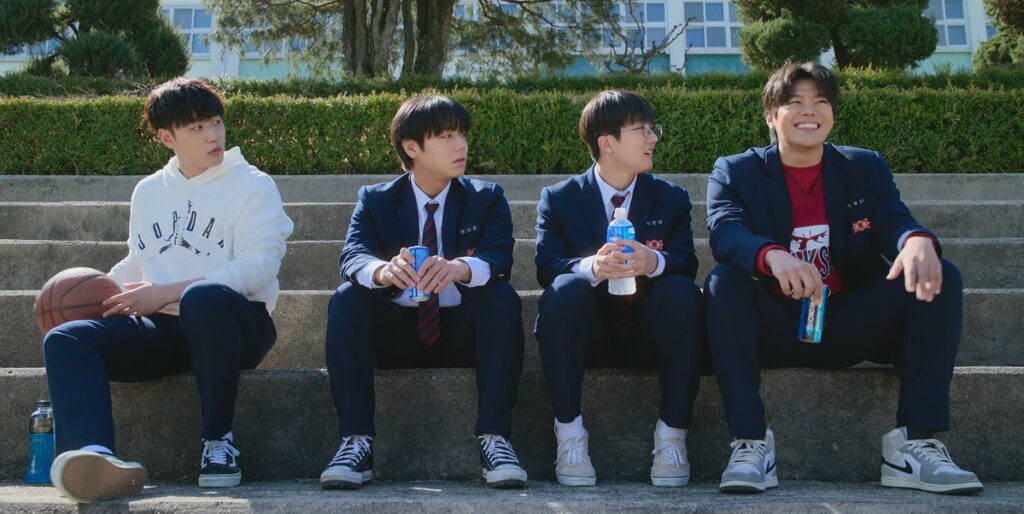
Do Real Si-euns Have Their Su-ho?
Well… We see that Si-eun has grown enough to convince himself that he can build a sustainable life with his new friends. However, the question still remains: do the real Si-euns in reality have Su-ho-like figures who will watch over them, saying “Have you been living well?” and “It looks good”?
If we’ve reached the stage of raising such questions, then this work has succeeded in conveying meaningful social implications beyond the school action genre – thanks to the refined script and meticulous curation of the original adaptation, as well as the sophisticated and precise direction that must have caused tremendous stress for the creators.
Of course, this also includes Park Ji-hoon’s outstanding performance, who externally embodied the remnants of internal struggle through his expressionless face, monotone speech, swollen face from insomnia, and awkward gait.
(To the point where it wouldn’t be surprising if I got fired…) It’s no exaggeration to say I spent these months caught in a fever like an early summer cold because of Weak Hero.
Knowing that there won’t be another work that will make me experience such a syndrome for a long time to come, I don’t regret a single moment of the two months I poured into this, and I was so happy to be able to freely enjoy high-level discussions with fans from various cultures who discovered my channel. In Seong-je’s way, it was stupidly romantic enough to stay up all night reviewing and discussing, but I was strangely, deeply happy.
This post (video) is my final small tribute to Weak Hero. Thank you for listening. Thank you so much for everything.
⛔️ Copyright Disclaimer: All drama footage, images, and references belong to their respective copyright holders including streaming platforms and original creators. Materials are used minimally for educational criticism and analysis with no intention of copyright infringement.
🚫 Privacy Policy: This site follows standard web policies and does not directly collect personal information beyond basic analytics for content improvement. We use cookies to enhance user experience and may display advertisements.
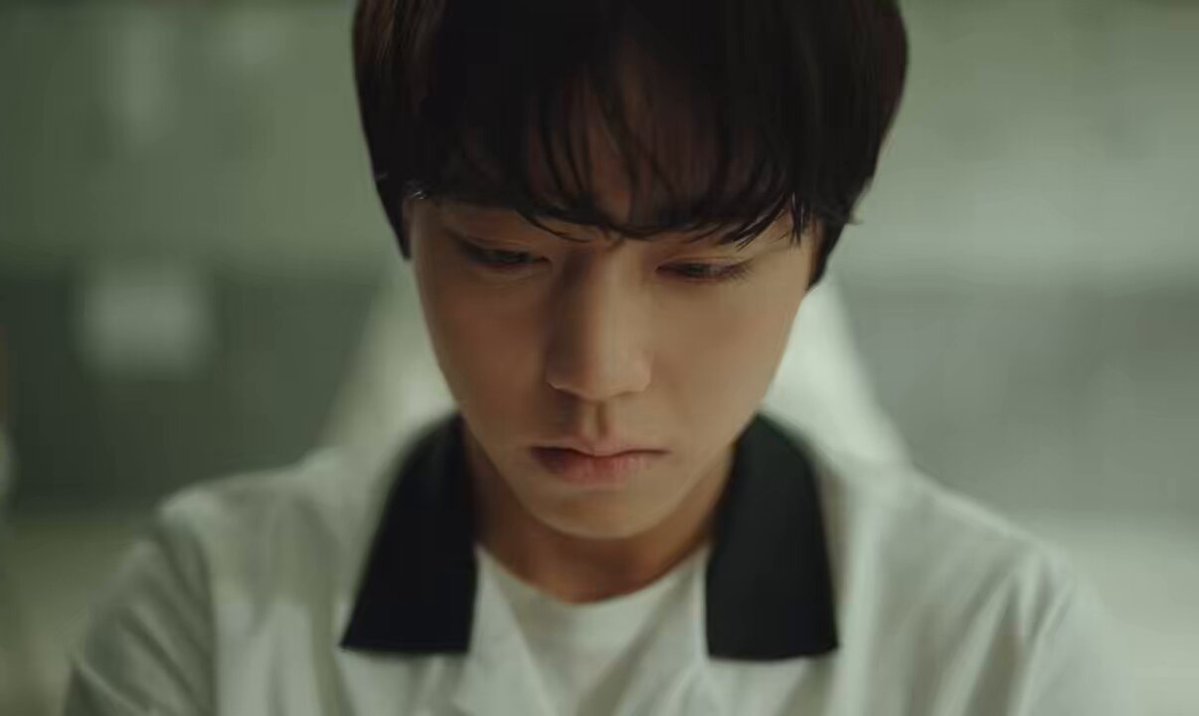
답글 남기기